2024年中考英语复习高频知识点复习(三)课件 (共27张PPT)
文档属性
| 名称 | 2024年中考英语复习高频知识点复习(三)课件 (共27张PPT) | 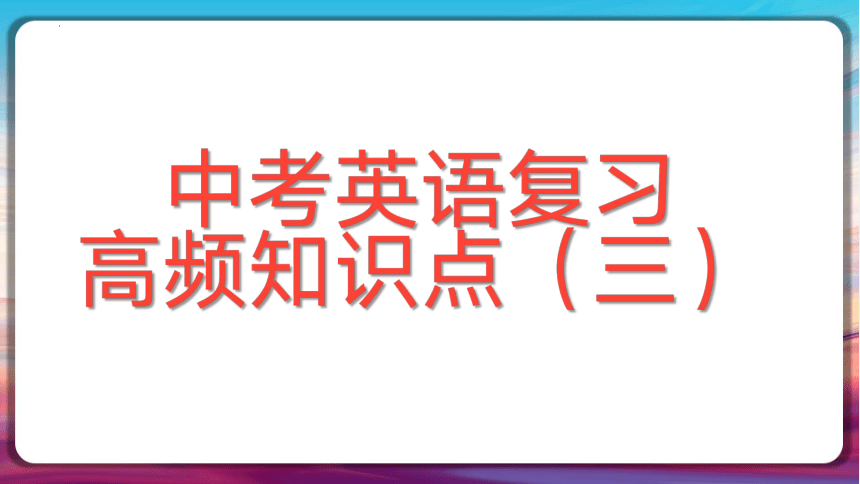 | |
| 格式 | pptx | ||
| 文件大小 | 11.6MB | ||
| 资源类型 | 教案 | ||
| 版本资源 | 通用版 | ||
| 科目 | 英语 | ||
| 更新时间 | 2024-06-12 22:46:26 | ||
图片预览

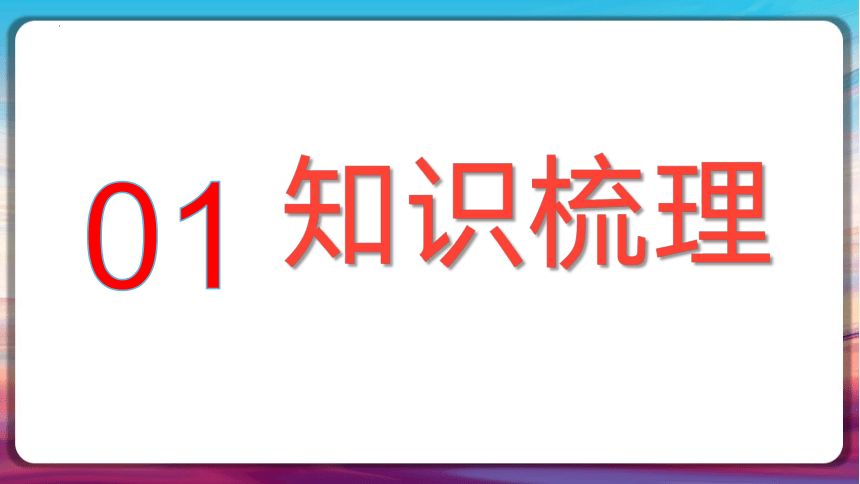

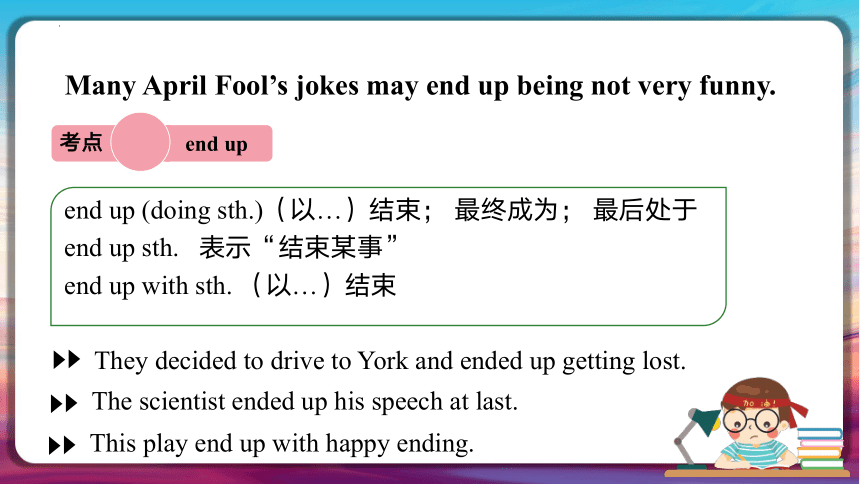
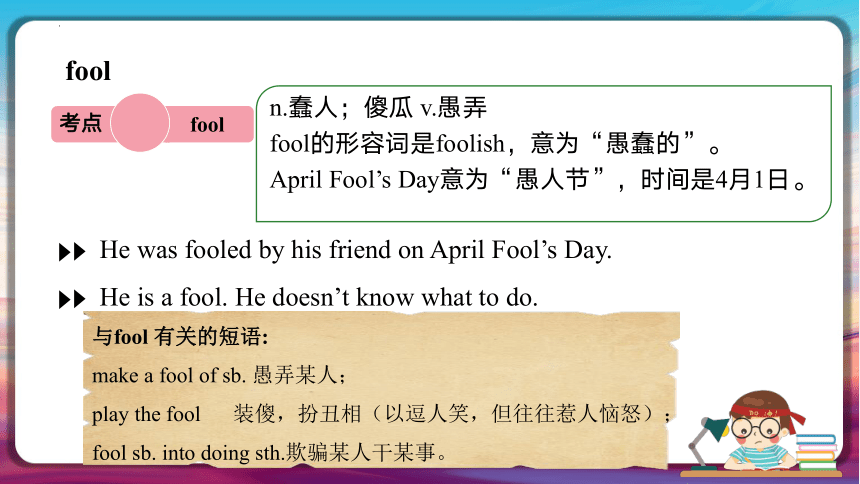
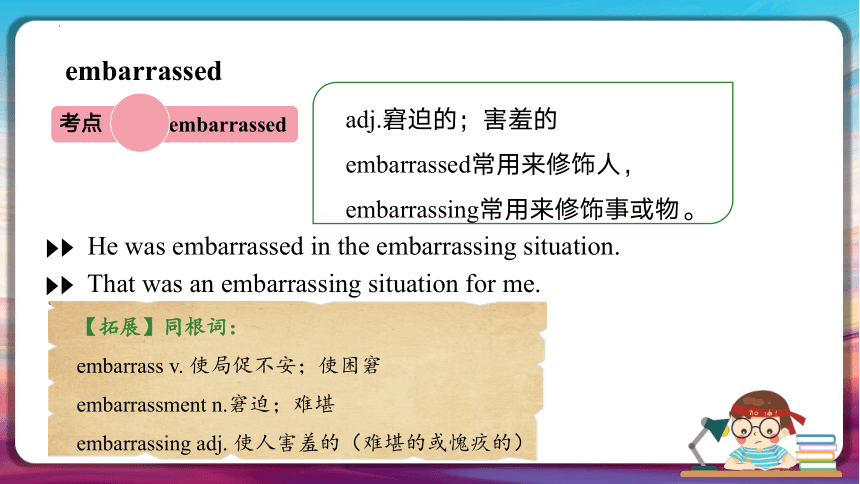
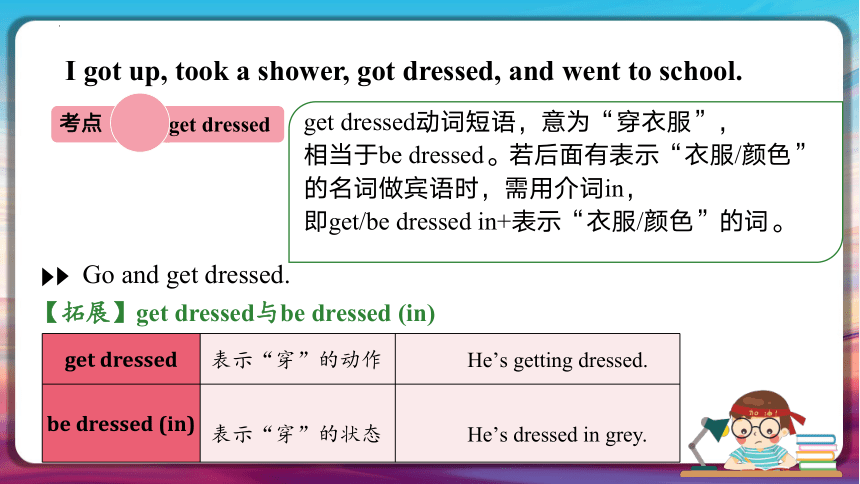
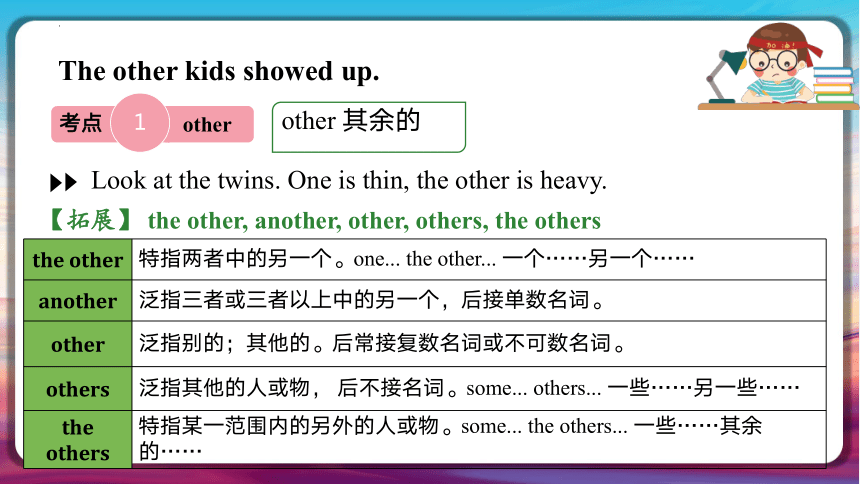
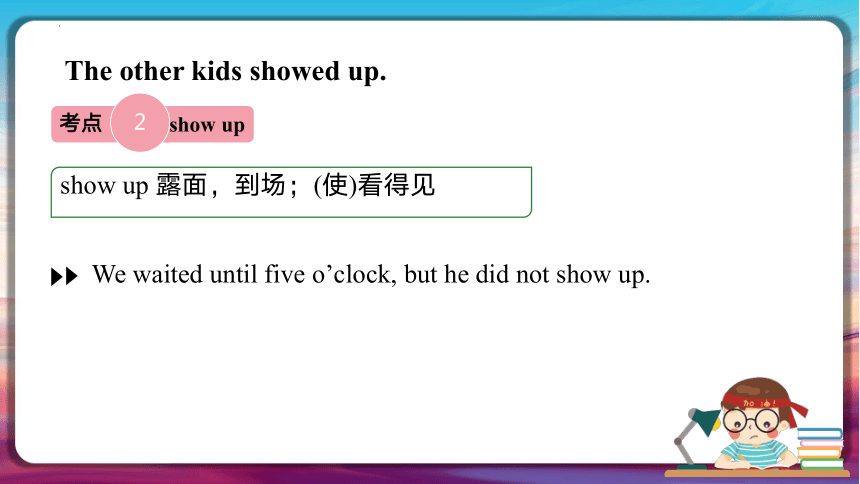
文档简介
(共27张PPT)
中考英语复习
高频知识点(三)
知识梳理
01
marry sb. 意为“嫁/娶某人”。
get married to sb. 意为“嫁/娶某人;与某人结婚”,为短暂性词组。
be married to sb. 意为“嫁/娶某人;与某人结婚”,是延续性词组。
考点 tell
marry
He asked her to marry him.
She married John last year.
= She got married to John last year.
= She has been married to John for one year.
end up (doing sth.)(以…)结束; 最终成为; 最后处于
end up sth. 表示“结束某事”
end up with sth. (以…)结束
考点 tell
end up
Many April Fool’s jokes may end up being not very funny.
They decided to drive to York and ended up getting lost.
The scientist ended up his speech at last.
This play end up with happy ending.
n.蠢人;傻瓜 v.愚弄
fool的形容词是foolish,意为“愚蠢的”。
April Fool’s Day意为“愚人节”,时间是4月1日。
考点 tell
fool
fool
He was fooled by his friend on April Fool’s Day.
He is a fool. He doesn’t know what to do.
与fool 有关的短语:
make a fool of sb. 愚弄某人;
play the fool 装傻,扮丑相(以逗人笑,但往往惹人恼怒);
fool sb. into doing sth.欺骗某人干某事。
adj.窘迫的;害羞的
embarrassed常用来修饰人,
embarrassing常用来修饰事或物。
考点 tell
embarrassed
embarrassed
He was embarrassed in the embarrassing situation.
【拓展】同根词:
embarrass v. 使局促不安;使困窘
embarrassment n.窘迫;难堪
embarrassing adj. 使人害羞的(难堪的或愧疚的)
That was an embarrassing situation for me.
get dressed动词短语,意为“穿衣服”,
相当于be dressed。若后面有表示“衣服/颜色”
的名词做宾语时,需用介词in,
即get/be dressed in+表示“衣服/颜色”的词。
考点 tell
get dressed
I got up, took a shower, got dressed, and went to school.
Go and get dressed.
【拓展】get dressed与be dressed (in)
get dressed
be dressed (in)
表示“穿”的动作
表示“穿”的状态
He’s getting dressed.
He’s dressed in grey.
other 其余的
考点 tell
other
1
The other kids showed up.
Look at the twins. One is thin, the other is heavy.
【拓展】 the other, another, other, others, the others
the other 特指两者中的另一个。one... the other... 一个……另一个……
another 泛指三者或三者以上中的另一个,后接单数名词。
other 泛指别的;其他的。后常接复数名词或不可数名词。
others 泛指其他的人或物, 后不接名词。some... others... 一些……另一些……
the others 特指某一范围内的另外的人或物。some... the others... 一些……其余的……
show up 露面,到场;(使)看得见
考点 tell
show up
2
The other kids showed up.
We waited until five o’clock, but he did not show up.
重点短语
in disbelief 不相信 ,疑惑, 怀疑
e.g.
She looked at him in disbelief.
她怀疑地看着他
He shook his head in disbelief.
他摇头表示不信。
above
一、作介词 prep1. 在...上面The moon is now above the trees.月亮正位于树梢上。2. 在...之上,超过They are children above six years old.他们是六岁以上的孩子。3. 高于;优于;胜过In the company, Dick ranks above Tom.在公司里,迪克的地位比汤姆高。4. 不屑于;不致于He considered himself above doing such things.他自认为是不会去做那种事的。
above
二、作副词
1.在上面;向上面
There are snowy peaks above.上面是白雪皑皑的群峰。
2. (级别、数目等)更高;更大;更多
Men and women of eighteen and above are eligible to vote.
年龄在十八岁以上的男女有投票表决权。
3. 在上文
See the examples given above.见上述例子。
三、作名词——上文;上述事实
In addition to all of the above, she won a Prize in 1980.
除上述外,她还在1980年获奖。
above 、on 、over
1. above的意思是“在…之上”,“高于…”,表示相对高度,不一定是在正上方,它的反义词是below. 例:The plane flew above the clouds.飞机在云层上面飞行。 2. over的意思是“在…之上”,表示在垂直之上,其反义词是under. 例:There is a bridge over the river. 河上有座桥。 There is a boat under the bridge. 桥下有一只船。 3.on的意思是“在…上面”,表示与表面接触。例: He put the book on the desk.他把书放在课桌上。
1.Ice is not often seen here in winter as the temperature normally stays zero.
A. up B. down
C. above D. below
【解析】本题考查介词词义辨析。up在……的上面;down在……的下面;above在上面;below在下面。句意为“这儿冬天很少看到冰,因为气温正常在零度以上。stay above zero在零度以上。故选C。
Life is full of the unexpected.
unexpected adj. 出乎意料的;始料不及的
e.g. It will not be unexpected if Tom comes late again, because he is always like this.
如果汤姆又迟到了,一点也不意外,因为他一向如此。
Life is full of the unexpected.
“the + 形容词”表示一类人或物
By the time I got up, my brother had already gotten in the shower.
by the time 在……以前,常引导表示过去的时间状语从句,主句常用过去完成时,即had + 动词过去分词。
e.g. By the time I got there, he had already left.
在我到那儿之前,他已经离开了。
When I got home, I realized I had left my keys in the backpack.
leave v. 忘了带;丢下
I left my bag on the bus.
Don’t leave the child by himself at home.
leave+宾语+地点状语 把······忘在某地
leave sb. by oneself 把某人单独留下
leave
【易混辨析】leave与forget
两词都可以表示“遗忘”的意思,其区别如下:
Sorry, I forgot my English book. I left it at home.
leave 通常与地点状语连用,表示将某物遗忘在某地。
forget 不与地点状语连用,表示忘记带某物。
So I just quickly put on some clothes...
put on 穿上
Please put on warm clothes when it’s cold.
You’d better put it on when you go out.
put on是动副短语,强调动作,反义短语是take off。其宾语若是代词,代词要放在put与on中间。
【拓展】put on的其他用法:
(1)增加(体重);发胖
Jenny put on 3 kilos during the Spring Festival.
(2)上演;举办
They sold their second-hand books, put on talent shows and asked for donations, even going door-to-door for them.
communicate with
rather than
pull together
in agreement
to one's surprise
as soon as
to start with
even though
Phrases
和……交流__________________
而不是____________
齐心协力_______________
令某人惊讶的是________________
(意见或看法)一致;同意______________
一……就…… ____________
起初;开始时 ______________
虽然;尽管 ____________
make me cry
I'd rather
because
while
the more
the more
1.悲伤的电影使我哭泣。
Sad movies ________ _ _______ ________.
2.我宁愿去蓝海餐厅,因为我喜欢吃饭的时候听轻音乐。
________ ________ go to Blue Ocean ________ I like to listen to quiet music ________ I'm eating.
3.哦,我越了解朱莉,我就越意识到我们有许多共同之处。
Well, _______ _______ I get to know Julie, _______ ________ I realize that we have a lot in common.
each time
What he needs
It's true that
4.每次和朱莉一起做某件事的时候,为什么不邀请艾丽斯加入呢?
Why don't you ask Alice to join you ________ ________ you do something with Julie
5.他需要的是一个快乐的人所穿的衬衫。
______ ______ ______ is the shirt of a happy person to wear.
6.我很出名,每个人都喜欢我的歌,这是真的。
________ ________ ________ I'm famous and everyone loves my songs.
being
followed
As soon as
Sentences
7.但是我并不快乐,因为我总是担心被人跟踪。
But I'm not happy because I'm always worried about ________ ________ by others.
8.他一走进门,他的爸爸就问……
________ ________ ________ he walked through the door, his father asked…
1.The boats take different routs, but they all____ in the same place.
A. give up B. clear up C. end up D. make up
2.The 18th Jiangsu Provincial Games will ______September. Many students want to be volunteers.
A. take place B. take part C. take action D. take care
3.She _______ for ten years and now she has a lovely daughter.
A. married B. has been married C. got married D. has got married
4.If it isn’t fine this weekend, our spring field trip _____.
A.is cancelled B. was cancelled C. will be cancelled
一、单项选择。
1. He is such a (fool) man. He often makes the same mistake again and again.
2. The situation was so (embarrass). I really wanted to leave the house.
3. Scientists have made many important (discover).
4. The plane seemed to (appear) suddenly. Nobody could find it.
5. What he said seemed quite (believe) and all of his friends believed him.
二、用所给单词的适当形式填空
foolish
embarrassing
discoveries
disappear
believable
1. My mother bought me a __________(旅行包) as a birthday present.
2. I _________(睡过头)because my alarm clock didn’t go off this morning.
3.I saw some boys _________ (play) basketball over there, so I went up to them and wanted to join them.
4.I said sorry to my mother because I had __________ (forget) to call her.
一、用正确的单词填空
backpack
overslept
playing
forgotten
二、根据汉语提示,完成下面的句子
1.今天早上我迟到了,因为我的闹钟没有响。
This morning I was late because my alarm clock didn’t ____ _____.
2.我意识到我把书包忘在家里了。
I realized that I ____ _______ my schoolbag at home.
3.在我到火车站之前,火车已经离开了。
___ _____ ____ I got to the train station, the train _____ already______.
had left
go off
By the time
had
left
thanks
中考英语复习
高频知识点(三)
知识梳理
01
marry sb. 意为“嫁/娶某人”。
get married to sb. 意为“嫁/娶某人;与某人结婚”,为短暂性词组。
be married to sb. 意为“嫁/娶某人;与某人结婚”,是延续性词组。
考点 tell
marry
He asked her to marry him.
She married John last year.
= She got married to John last year.
= She has been married to John for one year.
end up (doing sth.)(以…)结束; 最终成为; 最后处于
end up sth. 表示“结束某事”
end up with sth. (以…)结束
考点 tell
end up
Many April Fool’s jokes may end up being not very funny.
They decided to drive to York and ended up getting lost.
The scientist ended up his speech at last.
This play end up with happy ending.
n.蠢人;傻瓜 v.愚弄
fool的形容词是foolish,意为“愚蠢的”。
April Fool’s Day意为“愚人节”,时间是4月1日。
考点 tell
fool
fool
He was fooled by his friend on April Fool’s Day.
He is a fool. He doesn’t know what to do.
与fool 有关的短语:
make a fool of sb. 愚弄某人;
play the fool 装傻,扮丑相(以逗人笑,但往往惹人恼怒);
fool sb. into doing sth.欺骗某人干某事。
adj.窘迫的;害羞的
embarrassed常用来修饰人,
embarrassing常用来修饰事或物。
考点 tell
embarrassed
embarrassed
He was embarrassed in the embarrassing situation.
【拓展】同根词:
embarrass v. 使局促不安;使困窘
embarrassment n.窘迫;难堪
embarrassing adj. 使人害羞的(难堪的或愧疚的)
That was an embarrassing situation for me.
get dressed动词短语,意为“穿衣服”,
相当于be dressed。若后面有表示“衣服/颜色”
的名词做宾语时,需用介词in,
即get/be dressed in+表示“衣服/颜色”的词。
考点 tell
get dressed
I got up, took a shower, got dressed, and went to school.
Go and get dressed.
【拓展】get dressed与be dressed (in)
get dressed
be dressed (in)
表示“穿”的动作
表示“穿”的状态
He’s getting dressed.
He’s dressed in grey.
other 其余的
考点 tell
other
1
The other kids showed up.
Look at the twins. One is thin, the other is heavy.
【拓展】 the other, another, other, others, the others
the other 特指两者中的另一个。one... the other... 一个……另一个……
another 泛指三者或三者以上中的另一个,后接单数名词。
other 泛指别的;其他的。后常接复数名词或不可数名词。
others 泛指其他的人或物, 后不接名词。some... others... 一些……另一些……
the others 特指某一范围内的另外的人或物。some... the others... 一些……其余的……
show up 露面,到场;(使)看得见
考点 tell
show up
2
The other kids showed up.
We waited until five o’clock, but he did not show up.
重点短语
in disbelief 不相信 ,疑惑, 怀疑
e.g.
She looked at him in disbelief.
她怀疑地看着他
He shook his head in disbelief.
他摇头表示不信。
above
一、作介词 prep1. 在...上面The moon is now above the trees.月亮正位于树梢上。2. 在...之上,超过They are children above six years old.他们是六岁以上的孩子。3. 高于;优于;胜过In the company, Dick ranks above Tom.在公司里,迪克的地位比汤姆高。4. 不屑于;不致于He considered himself above doing such things.他自认为是不会去做那种事的。
above
二、作副词
1.在上面;向上面
There are snowy peaks above.上面是白雪皑皑的群峰。
2. (级别、数目等)更高;更大;更多
Men and women of eighteen and above are eligible to vote.
年龄在十八岁以上的男女有投票表决权。
3. 在上文
See the examples given above.见上述例子。
三、作名词——上文;上述事实
In addition to all of the above, she won a Prize in 1980.
除上述外,她还在1980年获奖。
above 、on 、over
1. above的意思是“在…之上”,“高于…”,表示相对高度,不一定是在正上方,它的反义词是below. 例:The plane flew above the clouds.飞机在云层上面飞行。 2. over的意思是“在…之上”,表示在垂直之上,其反义词是under. 例:There is a bridge over the river. 河上有座桥。 There is a boat under the bridge. 桥下有一只船。 3.on的意思是“在…上面”,表示与表面接触。例: He put the book on the desk.他把书放在课桌上。
1.Ice is not often seen here in winter as the temperature normally stays zero.
A. up B. down
C. above D. below
【解析】本题考查介词词义辨析。up在……的上面;down在……的下面;above在上面;below在下面。句意为“这儿冬天很少看到冰,因为气温正常在零度以上。stay above zero在零度以上。故选C。
Life is full of the unexpected.
unexpected adj. 出乎意料的;始料不及的
e.g. It will not be unexpected if Tom comes late again, because he is always like this.
如果汤姆又迟到了,一点也不意外,因为他一向如此。
Life is full of the unexpected.
“the + 形容词”表示一类人或物
By the time I got up, my brother had already gotten in the shower.
by the time 在……以前,常引导表示过去的时间状语从句,主句常用过去完成时,即had + 动词过去分词。
e.g. By the time I got there, he had already left.
在我到那儿之前,他已经离开了。
When I got home, I realized I had left my keys in the backpack.
leave v. 忘了带;丢下
I left my bag on the bus.
Don’t leave the child by himself at home.
leave+宾语+地点状语 把······忘在某地
leave sb. by oneself 把某人单独留下
leave
【易混辨析】leave与forget
两词都可以表示“遗忘”的意思,其区别如下:
Sorry, I forgot my English book. I left it at home.
leave 通常与地点状语连用,表示将某物遗忘在某地。
forget 不与地点状语连用,表示忘记带某物。
So I just quickly put on some clothes...
put on 穿上
Please put on warm clothes when it’s cold.
You’d better put it on when you go out.
put on是动副短语,强调动作,反义短语是take off。其宾语若是代词,代词要放在put与on中间。
【拓展】put on的其他用法:
(1)增加(体重);发胖
Jenny put on 3 kilos during the Spring Festival.
(2)上演;举办
They sold their second-hand books, put on talent shows and asked for donations, even going door-to-door for them.
communicate with
rather than
pull together
in agreement
to one's surprise
as soon as
to start with
even though
Phrases
和……交流__________________
而不是____________
齐心协力_______________
令某人惊讶的是________________
(意见或看法)一致;同意______________
一……就…… ____________
起初;开始时 ______________
虽然;尽管 ____________
make me cry
I'd rather
because
while
the more
the more
1.悲伤的电影使我哭泣。
Sad movies ________ _ _______ ________.
2.我宁愿去蓝海餐厅,因为我喜欢吃饭的时候听轻音乐。
________ ________ go to Blue Ocean ________ I like to listen to quiet music ________ I'm eating.
3.哦,我越了解朱莉,我就越意识到我们有许多共同之处。
Well, _______ _______ I get to know Julie, _______ ________ I realize that we have a lot in common.
each time
What he needs
It's true that
4.每次和朱莉一起做某件事的时候,为什么不邀请艾丽斯加入呢?
Why don't you ask Alice to join you ________ ________ you do something with Julie
5.他需要的是一个快乐的人所穿的衬衫。
______ ______ ______ is the shirt of a happy person to wear.
6.我很出名,每个人都喜欢我的歌,这是真的。
________ ________ ________ I'm famous and everyone loves my songs.
being
followed
As soon as
Sentences
7.但是我并不快乐,因为我总是担心被人跟踪。
But I'm not happy because I'm always worried about ________ ________ by others.
8.他一走进门,他的爸爸就问……
________ ________ ________ he walked through the door, his father asked…
1.The boats take different routs, but they all____ in the same place.
A. give up B. clear up C. end up D. make up
2.The 18th Jiangsu Provincial Games will ______September. Many students want to be volunteers.
A. take place B. take part C. take action D. take care
3.She _______ for ten years and now she has a lovely daughter.
A. married B. has been married C. got married D. has got married
4.If it isn’t fine this weekend, our spring field trip _____.
A.is cancelled B. was cancelled C. will be cancelled
一、单项选择。
1. He is such a (fool) man. He often makes the same mistake again and again.
2. The situation was so (embarrass). I really wanted to leave the house.
3. Scientists have made many important (discover).
4. The plane seemed to (appear) suddenly. Nobody could find it.
5. What he said seemed quite (believe) and all of his friends believed him.
二、用所给单词的适当形式填空
foolish
embarrassing
discoveries
disappear
believable
1. My mother bought me a __________(旅行包) as a birthday present.
2. I _________(睡过头)because my alarm clock didn’t go off this morning.
3.I saw some boys _________ (play) basketball over there, so I went up to them and wanted to join them.
4.I said sorry to my mother because I had __________ (forget) to call her.
一、用正确的单词填空
backpack
overslept
playing
forgotten
二、根据汉语提示,完成下面的句子
1.今天早上我迟到了,因为我的闹钟没有响。
This morning I was late because my alarm clock didn’t ____ _____.
2.我意识到我把书包忘在家里了。
I realized that I ____ _______ my schoolbag at home.
3.在我到火车站之前,火车已经离开了。
___ _____ ____ I got to the train station, the train _____ already______.
had left
go off
By the time
had
left
thanks
同课章节目录
